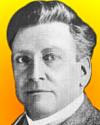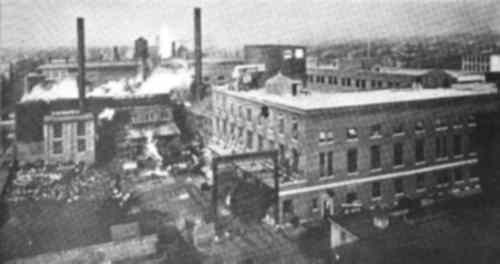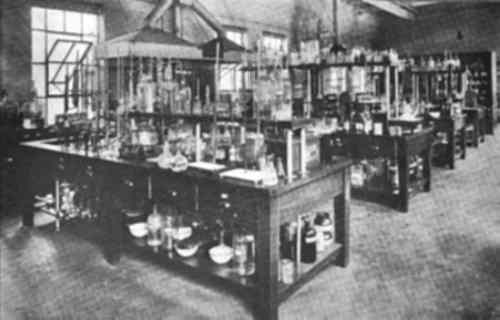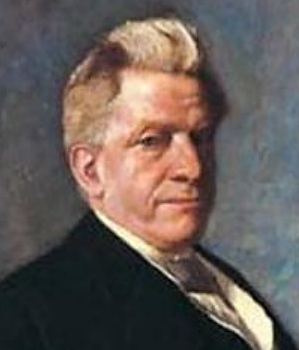 (source)
(source)
|
William Lever
(19 Sep 1851 - 7 May 1925)
British manufacturer and philanthropist who formed the Lever Brothers soap manufacturing company (1886) with his brother James. By 1914, soap production reached 60,000 tonnes.
|
Soap and Sociology
Biography of William Lever (Lord Leverhulme)
from The Chemical Age (1919)
[p.301] No industry has had a more lowly origin than the manufacture of soap, nor is there one which so intimately has reflected progress in the refinements of life. It is not an involved or intricate chemical industry; and it was not until the chemist went to work in the plant that an over-grown household art matured to a size and efficiency that compelled a respect which in the early days of the industry was lacking. The growth of an English enterprise in the life time of its founder, with American plants at Cambridge and Toronto, based upon success with soap, to the foremost industrial unit of the Kingdom, ranks among the best achievements that America can show.
ONE day a youth of 16 stood on the business side of the counter in a little English grocery store and looked about him. If he had been the average young man in such surroundings the chances are his eye would not have carried beyond a business horizon bounded by sugar barrels, shelves, or the old-fashioned bars of soap that necessitated a carving-knife operation every time the customers of those days called for soap.
But this young man saw more and farther. That soap, in particular, projected his horizon to the far corners of the earth. It implanted the germ of a big idea. Daily and yearly the idea expanded and matured.
In the great soap works of Port Sunlight, England, and its branches and auxiliaries throughout the civilized world, the big idea of the former grocery clerk, now Lord Leverhulme, has been fully developed and materialized. Lever Brothers, Ltd., Lord Leverhulme’s firm has a capital of $500,000,000 with 86,000 shareholders and ranks as the largest industrial company in the United Kingdom. It is one of the largest soap manufacturing concerns in the world and its products are distributed evervwhere.
The firm has an American factory at Cambridge, Mass. There are Canadian branches at Toronto Winnipeg. Calgary and Vancouver and factories scattered over Europe, Australia, South Africa and Japan. All told there are 93 constituent companies.
In the building up of this great organization the personality, breadth of vision and originality of Lord Leverhulme have been strikingly conspicuous. In 1887 he began the manufacture of soap in a factory which had an output of 20 tons a week. Today the Port Sunlight plant alone has a production of approximately 5,000 tons a week.
Lord Leverhulme’s methods in developing this vast industry were radically different from the usually conservative British methods. They were as striking and original as the live-wire methods of the most progressive of American concerns. In fact, in many respects they would be considered “advanced” even for American corporations.
The Leverhulme methods have brought their originator into public prominence as a pioneer in industrial innovations affecting working hours and the relationship of employer to employees. One of the most radical readjustments sponsored by Lord Leverhulme, [p.302] and one which has been most discussed by the press during Ins present visit to this country, is the six-hour day.
A feature of Lord Leverhulme’s visit to Boston, recently was a staff dinner of the Lever Brothers Company at the Hotel Somerset. There, some 350 employees of the American branch at Cambridge, met the founder of the corporation and were made to realize that in his way of thinking, and in actual fact, they do not work for Lever Brothers—they work with Lever Brothers. Gold watches, badges and certificates were distributed by Lord Leverhulme to members of the staff who had just completed 15 years with the company.
Certificates of co-partnership for 1919 were also distributed to staff-members who were already co-partners or who had qualified during the year.
In the various Lever Brothers works throughout the world there are some 15,000 employees. The great majority of these are capable of attaining co-partnership under the Leverhulme plan. In some parts of the world members of semi-civilized races are employed and they, of course, are not co-partnership eligibles but are taken care of in other ways.
Lord Leverhulme while in Boston addressed the Chamber of Commerce on “Human Relations in Industry” and his views attracted wide interest and comment.

William Hesketh Lever, was born in Lancashire in 1851 He was created a Baronet in 1911, (Sir William H. Lever, Bart.), and first Baron Leverhulme in 1917. Upon his insistence and contrary to all precedents, this title was formed by combining his family name with that of his wife, Hulme.
Port Sunlight is the “home town” of the Lever business. It is a built-to-order city of 462 acres, of which 239 acres are allotted to the works and 223 acres to the village. The houses are of substantial and attractive Elizabethan architecture, with gardens.
The town contains churches, clubs, schools for children of employees; technical and other schools for adults; an inn, swimming pool, hospital, library, gymnasium, baths, tennis courts and common gardens. The village represents an outlay of about $3,250,000. No houses are sold. The nominal rents paid by employees amount to a few shillings per week.
Besides the factory buildings, Port Sunlight contains such adjuncts as a 4-acre printing plant which produces printed matter of all kinds in every civilized language; and a box factory with a capacity of several million pieces weekly.
Countway(R).jpg)
F. A. Countway, Pres., Lever Bros. Co., Cambridge, Mass. (right)
Lord Leverhulme does not believe in profit sharing, since the worker cannot undertake the risk involved in loss sharing. In addition to the highest prevailing wages, co-partners in Lever Brothers each year receive certificates in proportion to wages or salary. These certificates contribute no capital to the business and earn on that account 5 per cent less than is paid on the ordinary shares. Dividends are paid in the form of preferred shares which the holder can sell at any time for cash at par value if he so desires. If, however, he holds them a bonus is paid which last year amounted to 20 per cent on the preferred shares, making a total dividend of 25 per cent for the year.
The system of allotment is based on value of service. The slacker receives nothing; the apathetic from 5 per cent to 10 per cent of their wages; the enthusiastic, appreciative and responsive above 10 per cent with special allotments for special services and helpful suggestions. In the case of the death of an employee the co-partnership certificates are cancelled, unless a widow is left. In that case the widow receives preferred shares in Lever Brothers in exchange for her late husband’s partnership certificates and she is entitled to hold them while she remains a widow.
According to the last report of the Company, Lever Brothers distributed about $1,000,000 in dividends to their co-partners. The total co-partnership certificates issued since this plan was put into operation in 1909 is $4,640,000.
In the opinion of Lord Leverhulme “high wages, bonuses, premiums or piece work, apart from a system of co-partnership can alone bring no solution of labor difficulties. Only the true spirit of co-partnership can tend in this direction, and, by combining the democratic with the individualistic attributes of human nature will result not only higher total earnings but greater efficiency, happier life and improved mental condition.
[p.303] “There is a great desire,” he says, “and not an unreasonable desire, and certainly a healthy desire, on the part of the workman to take some share in the control of the factory he works in and it is a desire that should be encouraged; but we cannot take a rank-and-file worker out of the factory today and put him on the Board of Directors and expect that he will be able to give valuable help and assistance. The desire to have a seat on Boards of Directors and a share in the control of industries is a healthy sign; but it would be madness and ruin to the industries if our Boards of Directors were not composed of trained men, and only by better education shall we be able to satisfy that reasonable ambition of the employee-workers.

“Where the quantity produced at any stage of manufacture is greatest, with the lowest cost of labor in proportion to the total cost of the product, there wages are the highest; and where the total cost of labor is the highest in proportion to the total cost of the product, wages are the lowest. Now, with the lessened proportion of labor to the total cost, there will have developed, to a very marked degree, the cheapening of the product, and only on these well-defined and well-tested lines can there be an increase in the earning power of labor.
“We must never lose sight of the fact that what is called the present labor unrest is healthy and encouraging, for it discloses a psychological problem just as large as one of wages and hours of employment. And in this aspect co-partnership means much more than sharing profits as an addition to wages. If means the spirit of comradeship—the spirit that recognizes equality and brotherhood; and it is working on these lines that the harmonizing of Capital and Labor best promises to dispel the present atmosphere of suspicion and distrust.
“Sweating the machine and not the worker,” says Lord Leverhulme, “makes possible and profitable the six hour day. This plan is applicable to any business in which the overhead charges equal or exceed the weekly payroll. It should not be inferred that the six-hour day means working the plant only six hours. The idea is to work the plant double time—twelve hours— with the two six hour shifts.
“The six hour day does not mean a loafer’s paradise. Its effect on the cost of continuous running of machinery is where we gain. Our machinery will run an increasing number of hours, even to the total of 24 hours, while the human being attending the machine is not running more than six hour shifts. We shall largely increase our power of production and of employment.”
It is intended that the time taken from hours of labor shall be used by the worker in mental and physical improvement. The Leverhulme theory is that cheapened product, increased leisure and resulting increased power of consumption will bring about further increased production resulting in the additional employment of capital, machinery and workers.
His staff are strong supporters of his co-partnership ideas. Recently a number of the Port Sunlight workers voted to remain co-partners in disregard of labor leaders’ arguments to the contrary.
During the war, at the instance of the Government, Lord Leverhulme undertook the manufacture of margarine for which Great Britain had largely theretofore [p.304] depended upon foreign producers. He at once entered upon this undertaking with such energy that the output was raised to huge proportions within a very short time and has since been continued on an increasing scale. One of the buildings hastily erected for margarine production near Port Sunlight was a quarter of a mile in length.
In the past year Lord Leverhulme has entered a new industry, purchasing the Islands of Lewis and Harris, off the Western Coast of Scotland. Lewis is about as large as Rhode Island and has 30,000 inhabitants. The principal town is Stornoway, where Stornoway Castle, Lord Leverhulme’s Lewis residence is situated. It is the centre of the West Coast fishing industry.
Next Lord Leverhulme began acquiring retail fish shops in England with initial purchases of more than 80. These are intended as the basis of a system of direct distribution. He is also installing extensive canning plants on the Island.
- Science Quotes by William Lever.
- 19 Sep - short biography, births, deaths and events on date of Lever's birth.
- The King of Sunlight: How William Lever Cleaned Up the World, by Adam Macqueen. - book suggestion.





